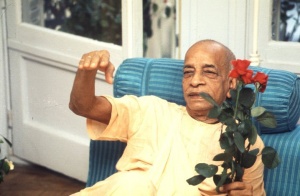SB 4.29.17: Difference between revisions
m (1 revision(s)) |
(Vanibot #0054 edit - transform synonyms into clickable links, which search similar occurrences) |
||
| (One intermediate revision by one other user not shown) | |||
| Line 1: | Line 1: | ||
{{info | {{info | ||
|speaker= | |speaker=Nārada Muni | ||
|listener=King | |listener=King Prācīnabarhiṣat | ||
}} | }} | ||
[[Category:Srimad-Bhagavatam - Canto 04 Chapter 29]] | |||
[[Category:Bhagavatam Verses Spoken by Narada Muni - Vanisource|042917]] | |||
<div style="float:left">'''[[Srimad-Bhagavatam]] - [[SB 4|Fourth Canto]] - [[SB 4.29: Talks Between Narada and King Pracinabarhi|Chapter 29: Talks Between Nārada and King Prācīnabarhi]]'''</div> | |||
<div style="float:right">[[File:Go-previous.png|link=SB 4.29.16]] '''[[SB 4.29.16]] - [[SB 4.29.18-20]]''' [[File:Go-next.png|link=SB 4.29.18-20]]</div> | |||
{{RandomImage}} | |||
==== TEXT 17 ==== | ==== TEXT 17 ==== | ||
<div | <div class="verse"> | ||
yathā yathā vikriyate | :yathā yathā vikriyate | ||
guṇākto vikaroti vā | :guṇākto vikaroti vā | ||
tathā tathopadraṣṭātmā | :tathā tathopadraṣṭātmā | ||
tad-vṛttīr anukāryate | :tad-vṛttīr anukāryate | ||
</div> | </div> | ||
| Line 16: | Line 22: | ||
==== SYNONYMS ==== | ==== SYNONYMS ==== | ||
<div | <div class="synonyms"> | ||
yathā | ''[//vanipedia.org/wiki/Special:VaniSearch?s=yathā&tab=syno_o&ds=1 yathā] [//vanipedia.org/wiki/Special:VaniSearch?s=yathā&tab=syno_o&ds=1 yathā]'' — just as; ''[//vanipedia.org/wiki/Special:VaniSearch?s=vikriyate&tab=syno_o&ds=1 vikriyate]'' — is agitated; ''[//vanipedia.org/wiki/Special:VaniSearch?s=guṇa&tab=syno_o&ds=1 guṇa]-[//vanipedia.org/wiki/Special:VaniSearch?s=aktaḥ&tab=syno_o&ds=1 aktaḥ]'' — associated with the modes of nature; ''[//vanipedia.org/wiki/Special:VaniSearch?s=vikaroti&tab=syno_o&ds=1 vikaroti]'' — as it does; ''[//vanipedia.org/wiki/Special:VaniSearch?s=vā&tab=syno_o&ds=1 vā]'' — or; ''[//vanipedia.org/wiki/Special:VaniSearch?s=tathā&tab=syno_o&ds=1 tathā] [//vanipedia.org/wiki/Special:VaniSearch?s=tathā&tab=syno_o&ds=1 tathā]'' — similarly; ''[//vanipedia.org/wiki/Special:VaniSearch?s=upadraṣṭā&tab=syno_o&ds=1 upadraṣṭā]'' — observer; ''[//vanipedia.org/wiki/Special:VaniSearch?s=ātmā&tab=syno_o&ds=1 ātmā]'' — the soul; ''[//vanipedia.org/wiki/Special:VaniSearch?s=tat&tab=syno_o&ds=1 tat]'' — of the intelligence; ''[//vanipedia.org/wiki/Special:VaniSearch?s=vṛttīḥ&tab=syno_o&ds=1 vṛttīḥ]'' — occupations; ''[//vanipedia.org/wiki/Special:VaniSearch?s=anukāryate&tab=syno_o&ds=1 anukāryate]'' — imitates. | ||
</div> | </div> | ||
| Line 23: | Line 29: | ||
==== TRANSLATION ==== | ==== TRANSLATION ==== | ||
<div | <div class="translation"> | ||
Formerly it was explained that the Queen is one's intelligence. While one is awake or asleep, that intelligence creates different situations. Being influenced by contaminated intelligence, the living entity envisions something and simply imitates the actions and reactions of his intelligence. | Formerly it was explained that the Queen is one's intelligence. While one is awake or asleep, that intelligence creates different situations. Being influenced by contaminated intelligence, the living entity envisions something and simply imitates the actions and reactions of his intelligence. | ||
</div> | </div> | ||
| Line 30: | Line 36: | ||
==== PURPORT ==== | ==== PURPORT ==== | ||
<div | <div class="purport"> | ||
The queen of Purañjana is described herein as intelligence itself. Intelligence acts both in the dream state and in the waking state, but it is contaminated by the three modes of material nature. Since the intelligence is contaminated, the living entity is also contaminated. In the conditioned state, the living entity acts according to his contaminated intelligence. Although he simply remains an observer, he nonetheless acts, being forced by a contaminated intelligence, which in reality is a passive agent. | The queen of Purañjana is described herein as intelligence itself. Intelligence acts both in the dream state and in the waking state, but it is contaminated by the three modes of material nature. Since the intelligence is contaminated, the living entity is also contaminated. In the conditioned state, the living entity acts according to his contaminated intelligence. Although he simply remains an observer, he nonetheless acts, being forced by a contaminated intelligence, which in reality is a passive agent. | ||
</div> | </div> | ||
__NOTOC__ | |||
<div style="float:right; clear:both;">[[File:Go-previous.png|link=SB 4.29.16]] '''[[SB 4.29.16]] - [[SB 4.29.18-20]]''' [[File:Go-next.png|link=SB 4.29.18-20]]</div> | |||
__NOTOC__ | |||
__NOEDITSECTION__ | |||
Latest revision as of 21:45, 18 February 2024

A.C. Bhaktivedanta Swami Prabhupada
TEXT 17
- yathā yathā vikriyate
- guṇākto vikaroti vā
- tathā tathopadraṣṭātmā
- tad-vṛttīr anukāryate
SYNONYMS
yathā yathā — just as; vikriyate — is agitated; guṇa-aktaḥ — associated with the modes of nature; vikaroti — as it does; vā — or; tathā tathā — similarly; upadraṣṭā — observer; ātmā — the soul; tat — of the intelligence; vṛttīḥ — occupations; anukāryate — imitates.
TRANSLATION
Formerly it was explained that the Queen is one's intelligence. While one is awake or asleep, that intelligence creates different situations. Being influenced by contaminated intelligence, the living entity envisions something and simply imitates the actions and reactions of his intelligence.
PURPORT
The queen of Purañjana is described herein as intelligence itself. Intelligence acts both in the dream state and in the waking state, but it is contaminated by the three modes of material nature. Since the intelligence is contaminated, the living entity is also contaminated. In the conditioned state, the living entity acts according to his contaminated intelligence. Although he simply remains an observer, he nonetheless acts, being forced by a contaminated intelligence, which in reality is a passive agent.